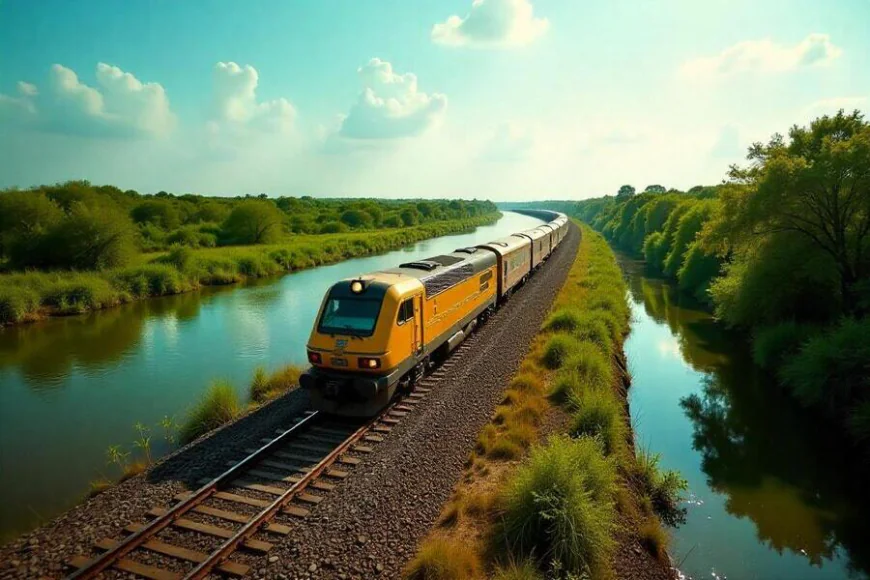Nigeria’s Railway Corporation Cuts Diesel Fuel Costs by Seventy Percent Through CNG Adoption, Promoting Sustainability, Lowering Emissions, and Stimulating Economic Growth Nationwide


Nigeria is making significant strides in modernizing its railway sector by adopting Compressed Natural Gas (CNG) technology. This initiative, spearheaded by the Nigerian Railway Corporation (NRC), aims to reduce the country’s reliance on diesel fuel, cutting operational costs by as much as 70%. This shift not only promises to increase efficiency but also promotes environmental sustainability, positioning Nigeria as a leader in the railway industry.
Slashing Fuel Costs and Reducing Emissions
The NRC’s move from diesel to CNG is centered on improving operational efficiency while addressing the environmental impact of traditional fuel sources. A successful pilot project has shown that fuel savings can exceed 60%, validating the potential of CNG to offer a cost-effective and eco-friendly alternative to diesel.
By significantly lowering fuel costs, this transition will also reduce transportation expenses, thereby improving the affordability of freight services and easing inflationary pressures on the economy. Lower operational costs will benefit not only the NRC but also the broader national economy, driving growth and fostering a more efficient logistics network.
Investing in Education and Infrastructure for a Sustainable Future
To support the widespread adoption of CNG, the NRC has partnered with the Presidential CNG Initiative to create a robust infrastructure that facilitates this transition. A key component of the initiative is the establishment of CNG conversion centers at NRC facilities across Nigeria. These centers will serve dual purposes: enabling the conversion of diesel-powered trains to CNG and providing training centers where students can learn how to maintain and operate CNG systems. These centers will collaborate with educational institutions in key cities such as Ibadan, Enugu, Kafanchan, and Zaria, helping to prepare a skilled workforce that can drive the country’s energy transition.
Additionally, NRC coaches will function as mobile platforms to raise awareness about the benefits of CNG, educating the public on its environmental and economic advantages. Pilot stations located in gas-rich regions like Oyo will distribute CNG to local commuters and small businesses, fostering a wider adoption of clean energy alternatives across the country.
Progress in Rail Infrastructure and Logistics
Under Nigeria’s Renewed Hope Agenda, substantial progress is being made in rail infrastructure, with major projects completed and others under development. Notable completed projects include the Port Harcourt–Aba line and the Lagos–Apapa Port corridor, which have greatly improved freight logistics. Meanwhile, new standard gauge rail lines connecting Lagos to Abuja and Port Harcourt to Maiduguri are in development, with additional inter-state projects planned for Akwa Ibom, Edo, and Jigawa.
The NRC has made notable improvements in freight logistics, enhancing the efficiency of goods transportation from the Apapa Port to Ibadan. Large-scale infrastructure projects, such as the AKK gas pipeline, are benefiting from this improved rail connectivity, helping to facilitate smoother and more reliable delivery of goods. However, ongoing concerns about the vandalism of rail infrastructure, particularly in areas like Lagos and Minna, highlight the need for greater public engagement and support to safeguard these critical assets.
Strengthening Collaboration for Nationwide Rail Development
Despite these challenges, partnerships with state governments, such as Lagos, Plateau, and Kaduna, are making significant contributions to the nation’s rail development. Through the “Railing with the States” initiative, these collaborations are improving rail track utilization, helping to create a more unified national rail network. The Lagos Red Line, for example, is now sharing tracks with the Lagos–Ibadan route, marking a step towards greater integration of Nigeria’s rail infrastructure.
The NRC is committed to reducing costs, improving connectivity, and investing in the future of the country’s rail sector. These efforts are part of a broader vision to create a more efficient and sustainable railway system that will help Nigeria unlock its full economic potential.
The adoption of CNG technology represents a major leap forward for Nigeria’s railway sector, offering significant reductions in fuel costs and emissions while paving the way for a more sustainable and efficient transportation network. By investing in infrastructure, education, and technology, Nigeria is positioning itself for long-term growth, economic resilience, and environmental stewardship. As the NRC continues to embrace clean energy alternatives and enhance its rail infrastructure, the potential for positive economic and environmental outcomes remains immense, establishing Nigeria as a regional leader in the railway industry.
The post Nigeria’s Railway Corporation Cuts Diesel Fuel Costs by Seventy Percent Through CNG Adoption, Promoting Sustainability, Lowering Emissions, and Stimulating Economic Growth Nationwide appeared first on Travel And Tour World.


